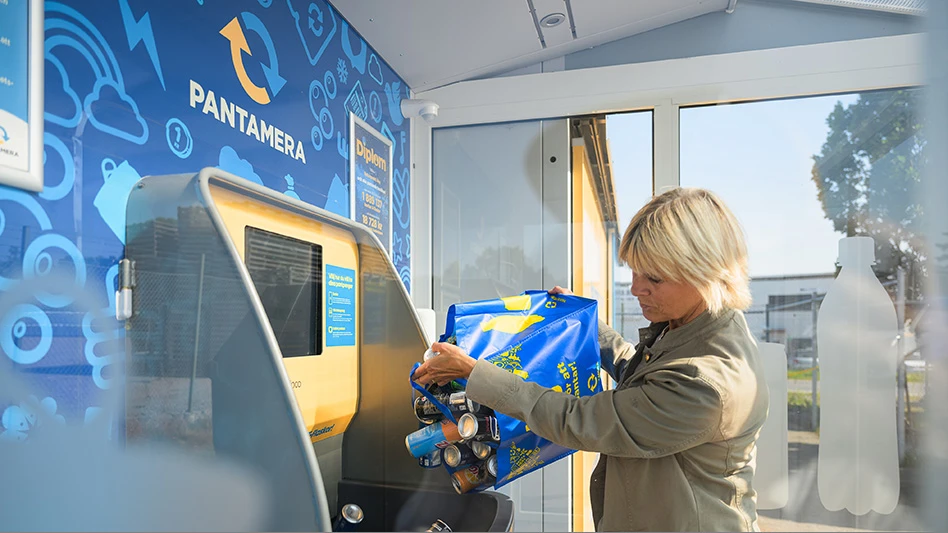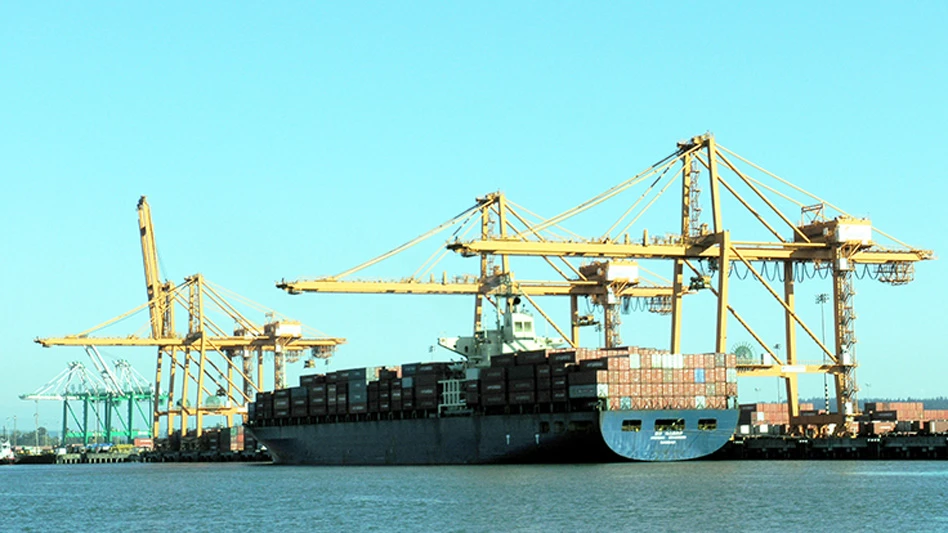Waste Expo '95 encourages solid waste and recycling professionals to take a forward-thinking approach.
We live in a forward thinking society. Not only in business, but in every aspect of our culture, we need to be not only adaptable to the issues of the day, but also prepared for the unexpected elements of the future.
Given the variety of challenges facing the solid waste and recycling industries, Environmental Industry Associations’ Waste Expo ’95 is "Going Beyond Today’s Solutions" to find progressive approaches to the issues of today as well as tomorrow. The conference, scheduled for April 24 through 28 at Chicago’s McCormick Place, promises to look to the horizon and beyond in search of solutions to industry-wide challenges.
Positioning for the future is not a new strategy for EIA, which has already undergone a major restructuring in recent years to encompass virtually every aspect of waste management. EIA is now the umbrella association that includes the memberships of the National Solid Wastes Management Association, the Hazardous Waste Management Association and the Waste Equipment Technology Association.
TOURS
Prior to the actual conference and exposition, EIA is sponsoring facility tours on Monday, April 24. Among them is a tour of Resource Management Inc.’s Plainfield Processing Facility, a privately owned and operated center equipped with three balers, 22 loading docks, custom-designed commingled container and paper sorting systems with mixed-glass recovery capabilities, eddy current separation, electromagnetic separation and air classification.
The Resource Management tour also includes a look at the Container Recycling Alliance’s processing facility, where reclaimed glass is converted into furnace-ready cullet. CRA processes some 100,000 tons of glass annually.
The last stop on the tour includes a stop at the Ball Glass Container Corp., where furnace ready cullet is used as feedstock. This portion of the tour will provide a look at how recovered glass is melted down and used in production of new glass containers. The process includes furnaces heated to 2,800 degrees, which melt the cullet and other raw materials.
Also available in Monday’s tour package is the "Waste in Motion" tour of a transfer station and a landfill. The tour begins at the Wheeling Township Transfer Station, an 82,000-square-foot state-of-the-art baling transfer facility with a processing capacity of more than 1,500 tons per day. The final stop on the "Waste in Motion" tour will be USA Waste Services Inc.’s Countryside Landfill, an 80-acre facility near Chicago.
MANAGEMENT
Educational sessions at the conference begin on Tuesday, April 25, and cover a wide range of topics relative to waste management and recycling.
A legislative briefing on Tuesday morning at 9:30 a.m. is designed to help members catch up on federal legislation affecting the entire waste industry. Topics for discussion include: Superfund reform, interstate trade, flow control and product liability.
Discussion of legislative issues continues later on Tuesday, with the "Eye on Washington" session scheduled for 2:15 to 3:45 p.m. The meeting is scheduled to cover issues that will affect the solid waste and recycling industries as the 104th Congress carries out its contract with America.
Those interested in merging their business onto the information superhighway should check out "Getting Online with Tomorrow’s Technology," Wednesday morning at 8 a.m. Attendees can learn how CD ROM, fax-on-demand and other technological advances can take your company into the 21st century. Actual demonstrations will provide a first-hand look at how these technologies work, and how they can work for you. Scheduled speaker is Frank Butler, Jr., of Information Technologies Corp., Richmond, Va.
INTERNATIONAL
Learn how to expand your international business at "How to Increase Exports," Tuesday morning at 9:30 a.m. Scheduled topics in this session include: how to get started in exporting; what you need to know about trade financing; and success stories in exporting environmental technologies. Tyler Hawkins, U.S. Department of Commerce, Washington, will moderate the program. Scheduled speakers include Jeanne Derderian, LaSalle National Bank, Chicago, Ill.; Todd Obmascik, P&P International Inc., Rockford, Ill.; Robin Mugford, U.S. Department of Commerce, Chicago, Ill.; and John Austin, Department of Commerce, Louisville, Ky.
Also on the international front, "Experience Asia," on Tuesday, April 24, at 4 p.m., will discuss how China is managing its growth-to-solid-waste ratio; an evaluation of the Philippines waste program; and how the U.S. can provide assistance to the Asian waste industry. Speakers include Leandro Ramos, Jr., Cal-EPA/Integrated Waste Management Board, Sacramento; and Gordon Ng, University of Hong Kong.
RECYCLING
As the lines between the recycling industry and solid waste management industry become less clearly defined, recycling has taken a more prominent position at the EIA conference agenda.
The recycling package includes "Turning a New Leaf on Composting," Tuesday at 9:30 a.m., a discussion of how composting has grown from its traditional roots in backyard projects and has proven to be an environmentally sound waste management alternative. The session will include discussion of how bans and rising costs for land disposal are increasing the need for composting; how private expertise can help revive municipal composting projects; and how to locate markets for end products. Speaker is Caroline Repenning, GreenCycle Inc., McHenry, Ill.
"Building Opportunities with C&D Waste" at 11:15 a.m. on Tuesday will look at how haulers and building contractors are working together to capture recyclables from this neglected segment of the waste stream. Attendees will learn: specifications for C&D separation installed in building contracts; why manufacturers are continuing to come up with new end uses; and how haulers and contractors can work together. Scheduled speaker is M. Skokry Rashwan, I.C.E.S. Inc., Alberta, Canada.
As markets for materials continue to fluctuate, recyclers will want to sit in on the "Price Check on Recyclables," Tuesday at 4 p.m. Find out whether the historical prices of 1994 will continue in 1995; if mills and plants will continue to have hardship in finding feedstock to run at capacity; and what the future holds overall for recyclables.
"The Modern MRF," at 9:45 a.m. on Tuesday, is aimed at facility planners and managers who daily face the potential problems and hazards created by the combination of various types of processing machinery into an integrated system. Learn about the need for sequenced, interconnected safety features, systems approaches to energy control and new training requirements for workers on the process lines.
Waste Expo ’95 is designed to show today’s waste hauler and recycler how to go beyond today’s solutions and be a part of the industry’s future. With sweeping issues on the horizon, few can afford not to partake in this educational and business opportunity.
BRANDSMA FORECASTS GOOD YEAR, TOUGH ISSUES
The current strong economy translates into a prosperous outlook for the solid waste and recycling industries, according to Lee Brandsma, chairman of Environmental Industry Associations.
Brandsma is confident that attendees at this year’s Waste Expo in Chicago will see "an extremely professional show," citing pre-registration figures that include some 500 exhibitors occupying more than 200,000 square feet of space at Chicago’s McCormick Place.
"There are right now only six cities in the United States that can handle a group our size," says Brandsma.
In addition to the exhibitors’ portion of the conference, the educational sessions promise to be equally relevant, says Brandsma. "We got all the input from all of our different constituent groups, and made sure that all their hot buttons were taken care of."
All of this success is due in large part to the vastly improved economy over the last 12 to 18 months.
"We’re getting a lot of good feedback from all of our members from around the country regarding business conditions," says Brandsma. "It’s one of those years when everything is kind of falling into place."
However strong the economy, there are issues yet to be ironed out, he notes. Some affect the industry as a whole, while others affect individual markets in different ways.
"You have to look at our business market by market," he says. "In certain markets, for example, there is significant disposal capacity, therefore pricing is down. Other markets do have disposal problems. All those problems mean is that you have to transfer material farther away, which is an added cost. There really isn’t a capacity issue at the present time, but there is a location issue."
The recycling side of the solid waste management industry, meanwhile, has become less of a liability in recent years and more of an opportunity, due in large part to the current hot paper markets.
"We don’t know how long (the paper situation) is going to last," he says. "We’ve been told a year or two. And that’s wonderful. We’re going to ride that horse as long as we can. But we all know that it’s a different business from what we’re used to, and we’re educating ourselves to this new business. It’s significantly cyclical, and we’re at the top of the cycle now."
Consolidation, meanwhile, continues to be a trend in the solid waste management industry, Brandsma observes.
"The smaller public companies are desperately trying to grow," he notes. "And the only real way to grow is through acquisition, to give them those significant growth numbers that they need to keep their stock prices up."
In general, Brandsma predicts "a good year" for the environmental industry. "It almost cannot help but be a good year...I don’t see a whole lot that could impact it that negatively."
INTERSTATE, FLOW CONTROL TOP AGENDA: FRISCHKORN
Allen "Mike" Frischkorn, Jr., president and chief executive officer of Environmental Industry Associations, points to flow control and interstate transport restrictions as the two most significant issues facing the solid waste industry.
Unfortunately, the likelihood of either or both being addressed from a legislative standpoint in the immediate future remains unclear, he says.
"Whether anything is going to happen on those issues is problematical," says Frischkorn. "You can never predict what (Congress) is going to do. Making a piece of legislation is not as easy as it might seem in a high school civics course. It can get hung up anywhere. And even if you pass it all the way through to some kind of House-Senate conference, even that might get stalled. And even if it does work, it might get vetoed, for reasons totally unrelated to the matters of the bill."
Regardless of what the outcome might be, Frischkorn says EIA opposes flow control, and considers it little more than a government monopoly. "Quite frankly we’re amazed that the Republicans, who really ought to know better, continue to toy around with some type of flow control bill," he adds.
His sentiment toward interstate transport regulation is very similar. "We just don’t think that legislation is needed," he says. "We think that the market is quite sufficient to allocate waste across state lines. But that’s not stopping the politicians in Congress from trying to do something about it."
Another concern among the solid waste industry stems from the privatization of waste services. "We continue to believe that privatization makes more sense, that states and municipalities will save money by going out on a competitive basis with private contractors to provide waste services," he says. "I think that's an ongoing issue."
Along with privatization comes responsibility, however. Stories in the news media about unethical behavior among some members of the industry have raised concerns — both outside and within the industry — about business ethics in general, says Frischkorn. negative publiscity tends to have a distorting effect, he says.
"Despite some highly-publicized prosecutions of some waste hauling companies, you’re talking about a minuscule fraction of the industry actually being dishonest," he says. "I think that the press often blows that out of proportion. We’re doing everything we can to put forward the best possible image of the industry. Ethics is high on our list of priorities."
The solid waste industry has taken on more global proportions in recent years, he adds. "We're getting an increasingly large international contingent coming to the show. Last year, about 1,000 attendees — almost 10 percent — were international. This year we expect to have even more..It's becoming an international show, a global show. That’s the direction that we’re driving it."
Get curated news on YOUR industry.
Enter your email to receive our newsletters.

Explore the April 1995 Issue
Check out more from this issue and find your next story to read.
Latest from Recycling Today
- Nucor expects slimmer profits in early 2025
- CP Group announces new senior vice president
- APR publishes Design Guide in French
- AmSty recorded first sales of PolyRenew Styrene in 2024
- PRE says EU’s plastic recycling industry at a breaking point
- Call2Recycle Canada, Staples Professional expand partnership
- Circular Services breaks ground on north Texas MRF
- Tariff uncertainty results in choppy nonferrous scrap flows





